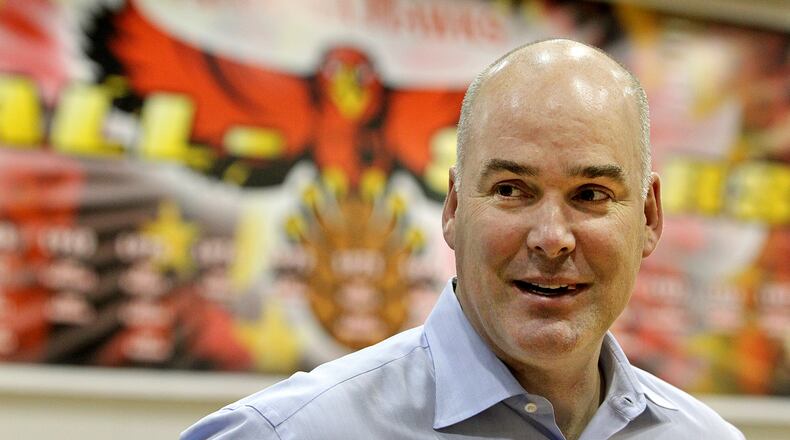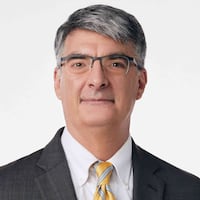Danny Ferry hasn’t talked publicly about the diagnosis that has affected his family.
Until now.
One of his daughters has a vascular anomaly that requires attention from eight different specialists. The family has made many trips to Boston Children’s Hospital so Sophia could undergo extensive procedures and surgeries to deal with her condition.
They, and many others so affected, no longer will have to travel such a great distance for needed care.
On May 9, Children’s Healthcare of Atlanta (CHOA) and Emory will open a Vascular Anomaly Clinic (VAC). It will be modeled after the clinic in Boston. Ferry and his wife, Tiffany, played a part in bringing such a facility to the Southeast and plan to fund much-needed research associated with the clinic. Their foundation formed six years ago, the Lymphatic Malformation Institute, will host and fund a conference June 10-11 to bring physicians from around the world to Atlanta to further explore diagnostics and care.
“When we found out about our daughter’s condition seven years ago, the news was scary,” Ferry, the former Hawks general manager, told The Atlanta Journal-Constitution in an exclusive interview. “Initially, doctors told us she had leukemia, but after tests and biopsy they determined her actual diagnosis and conveyed we would wish she had leukemia. It was that serious.
“Despite Sophia’s diagnosis and numerous procedures, surgeries and hospital time, she has been lucky because her health has been relatively stable, and our family has the resources to travel to care as needed. We have been lobbying CHOA and Emory to open a VAC because there was a great need in the Southeast. It’s difficult but so important to get coordinated care as it puts care in the best position to succeed and the family in a better position to make challenging decisions.”
Vascular anomalies are a wide-ranging number of conditions that can affect many different parts of the body. That is why one patient may have to see many different specialists for their diagnosis. There are four main cities with hospitals in the United States that care for such conditions — Boston, Cincinnati, Seattle and Milwaukee. And soon Atlanta.
“To keep it very simple, any place in your body where you have blood vessels, whether it’s arteries, veins or lymphatic, you can have a vascular anomaly,” said Dr. Matt Hawkins, who will serve as medical director for the Atlanta VAC. “These diseases have a huge range. Some people have anomalies and have no problems at all, but then they go all the way up to very complex syndromes that involve multiple parts of the body and require a number of physicians to aid in their care. Historically, there just haven’t been very many places where you can get organized, programmatic care for vascular anomalies, particularly for children.”
According to Hawkins, the clinic will be a place where a patient can come and, in one room, see up to five specialists, including interventional radiology, hematology, otolaryngology, dermatology and pediatric surgery. There also will be a specialized list of preferred consultants who are part of the clinic for those who are affected in other parts of the body to streamline referrals.
Ferry has the financial resources to care for his daughter. When he joined the Hawks as general manager in 2012 he even had clauses in his contract concerning her care. Others are not so fortunate.
“Despite my diagnosis, I have been very fortunate,” said Sophia, a 16-year-old who plays tennis and swims. “I am one of the healthier patients, and I have been able to travel for treatment. Having a VAC in this region will give many other people an opportunity for much better and easier health care because it will be at CHOA under one roof. This VAC will mean so much to families who can’t travel so far to find experts in their disease. This VAC opening here means a lot to me and many other patients.”
The conference in June will provide an opportunity for physicians to gather and discuss a little-known subset of vascular anomalies, specifically diagnostic criteria for Gorham-Stout Disease (GSD) and Generalized Lymphatic Anomaly (GLA).
“With the help of Danny and Tiffany, we are very well positioned to run a really successful clinic for the kids in the Southeast,” Hawkins said. “I think it’s going to be much bigger than any of us realize. I treat a lot of vascular anomalies as an interventional radiologist. Our role in the treatment of vascular anomalies has expanded exponentially in the last 10 years. What I’ve observed since I moved to the Southeast is there is just an incredible need for this down here, and there were families that were trying to find ways to fly up to Boston.
“It puts the onus on the parent to coordinate all that care when you are going to see multiple doctors and getting procedures at multiple facilities; a surgery here, an appointment there. You can imagine how challenging that is. We are trying to be very patient-centered with this.”
Ferry continues to stay involved in basketball while he and his family work to support the new VAC in Atlanta. Ferry and the Hawks mutually agreed to part ways in June, the culmination of a well-documented controversy over statements he made about free-agent target Luol Deng on a conference call with previous ownership and management. He was a candidate for the general manager’s job with the Brooklyn Nets earlier this year.
“Along with working with my wife, Tiffany, on the June conference in Atlanta, it’s been a really productive year,” Ferry said. “I have stayed busy with family, visiting different friends and teams, both NBA and college, and watching a lot of games to stay connected to the game. Luol and I continue to stay in contact. We had dinner a few weeks ago, and we still have a project to do together.
“Again, so many people have been and continue to be really good to me, and I am appreciative. I am looking at different opportunities in the NBA, have had some very positive conversations, but the next move I make will definitely be what is best for my family as well.”
Whether another job in basketball comes his way, Ferry continues to work on the project that is so near and so dear to the hearts of him and his family.
“Again, Sophia has been fortunate but still has a team of eight different types of doctors overseeing and maintaining her healthcare. The ability to get high-level care for this under-served patient community will be available here in Atlanta now. We are ecstatic and want to make sure there is an awareness and it is supported. We will work with the community at large and the various patient support groups to help make sure this happens.
“There was nothing really being done to research a better understanding of the condition and treatments. The research foundation we started six years ago was to give patients real hope. We are very proud to be able to bring our conference to Atlanta. In June we will have 60 leading doctors from throughout the world along with the doctors here at CHOA to work to improve diagnostics and patient care. We think it is a great way to kick off CHOA’s VAC.”
About the Author
Keep Reading
The Latest
Featured


